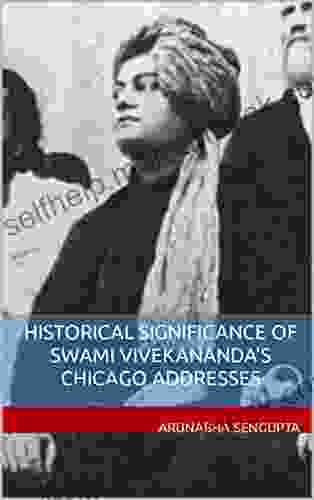The Enduring Impact of Swami Vivekananda's Chicago Addresses: A Historical Perspective

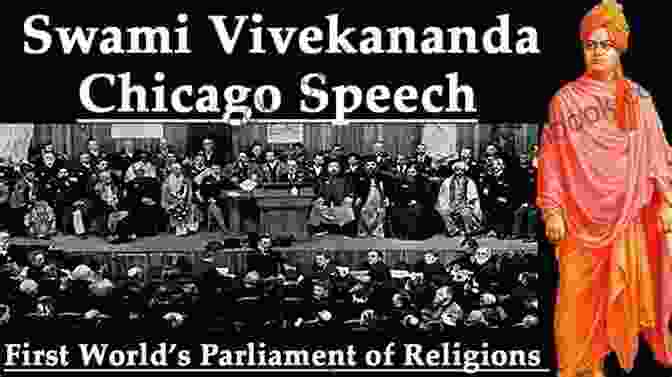
In the annals of religious and philosophical history, Swami Vivekananda's addresses at the World Parliament of Religions in Chicago in 1893 stand as a pivotal moment. His eloquent words, imbued with wisdom, passion, and spiritual insight, left an indelible mark on the global consciousness, transforming the perception of Hinduism and Eastern thought in the West.
4.8 out of 5
| Language | : | English |
| File size | : | 827 KB |
| Text-to-Speech | : | Enabled |
| Screen Reader | : | Supported |
| Enhanced typesetting | : | Enabled |
| Word Wise | : | Enabled |
| Print length | : | 18 pages |
| Lending | : | Enabled |
Historical Context: The World Parliament of Religions
The World Parliament of Religions was a groundbreaking event held in Chicago, United States, from September 11 to 27, 1893. It was the first time that representatives from diverse religions, races, and cultures gathered to engage in a dialogue about their beliefs and practices.
The Parliament was organized by the Universalist minister John Henry Barrows, who believed that such a gathering would foster interfaith understanding and promote global harmony. More than 400 speakers addressed the Parliament, representing a wide range of religions, including Christianity, Islam, Judaism, Hinduism, Buddhism, and Zoroastrianism.
Swami Vivekananda's Background and Journey to Chicago
Swami Vivekananda (born Narendranath Datta) was a prominent disciple of Swami Ramakrishna, a renowned Indian mystic and spiritual teacher. He was known for his brilliant intellect, persuasive oratory, and unwavering commitment to spreading the teachings of Hinduism.
In 1893, at the request of his mentor, Swami Vivekananda traveled to Chicago to represent Hinduism at the World Parliament of Religions. He arrived in the United States with limited funds and no formal credentials, but his exceptional abilities soon garnered attention.
Impact of Swami Vivekananda's Addresses
Swami Vivekananda delivered two impactful speeches at the Parliament. His first address, on September 11, 1893, introduced the ancient philosophy of Vedanta and the universal principles of Hinduism.
He began his speech with the iconic words, "Sisters and brothers of America," acknowledging the audience's shared humanity. He emphasized the unity of all religions, stating that they are all expressions of the same divine truth. He also condemned religious intolerance, urging the world to embrace diversity and mutual respect.
Vivekananda's second address, on September 19, 1893, focused on the practical aspects of Hinduism, particularly its emphasis on ethics, self-realization, and social service. He argued that true religion should lead to a life of service and compassion.
Both speeches were met with thunderous applause and praise. Vivekananda's eloquence and sincerity won the hearts of the audience. He became a celebrated figure in the West, and his teachings influenced countless individuals, including intellectuals, religious leaders, and social reformers.
Key Teachings of Swami Vivekananda
Through his speeches, Swami Vivekananda disseminated several key teachings that resonated with the global audience:
- Unity of Religions: Vivekananda emphasized that all religions share a common goal of spiritual realization, regardless of their external differences.
- Practical Spirituality: He believed that spirituality should not be confined to abstract theories but should be lived through daily actions and service to humanity.
- Self-Realization: Vivekananda taught that the ultimate goal of human life is to realize the divine within oneself.
- Harmony and Tolerance: He condemned religious intolerance and called for a world where all faiths could coexist peacefully.
Legacy and Impact
The impact of Swami Vivekananda's Chicago addresses extended far beyond the walls of the Parliament. His teachings sparked a renewed interest in Hinduism and Eastern philosophy in the West, and his words continue to inspire generations of seekers.
Vivekananda's emphasis on unity, tolerance, and practical spirituality has made him a symbol of interfaith harmony and spiritual awakening. His teachings have influenced numerous religious and social movements, both in the East and the West.
The Vedanta Society of New York, which Vivekananda founded in 1894, continues to spread his teachings and promote interfaith understanding worldwide. His legacy lives on in the countless individuals and organizations that strive to live by his principles.
Swami Vivekananda's Chicago addresses were a transformative moment in religious and philosophical history. His eloquent words, imbued with wisdom and compassion, introduced the world to the profound teachings of Hinduism and sparked a global awakening to the unity of all faiths.
The impact of his addresses endures to this day, inspiring countless individuals to embrace the principles of tolerance, harmony, and self-realization. Swami Vivekananda's legacy as a spiritual guide and ambassador of peace continues to inspire and enlighten generations.
4.8 out of 5
| Language | : | English |
| File size | : | 827 KB |
| Text-to-Speech | : | Enabled |
| Screen Reader | : | Supported |
| Enhanced typesetting | : | Enabled |
| Word Wise | : | Enabled |
| Print length | : | 18 pages |
| Lending | : | Enabled |
Do you want to contribute by writing guest posts on this blog?
Please contact us and send us a resume of previous articles that you have written.
 Top Book
Top Book Novel
Novel Fiction
Fiction Nonfiction
Nonfiction Literature
Literature Paperback
Paperback Hardcover
Hardcover E-book
E-book Audiobook
Audiobook Bestseller
Bestseller Classic
Classic Mystery
Mystery Thriller
Thriller Romance
Romance Fantasy
Fantasy Science Fiction
Science Fiction Biography
Biography Memoir
Memoir Autobiography
Autobiography Poetry
Poetry Drama
Drama Historical Fiction
Historical Fiction Self-help
Self-help Young Adult
Young Adult Childrens Books
Childrens Books Graphic Novel
Graphic Novel Anthology
Anthology Series
Series Encyclopedia
Encyclopedia Reference
Reference Guidebook
Guidebook Textbook
Textbook Workbook
Workbook Journal
Journal Diary
Diary Manuscript
Manuscript Folio
Folio Pulp Fiction
Pulp Fiction Short Stories
Short Stories Fairy Tales
Fairy Tales Fables
Fables Mythology
Mythology Philosophy
Philosophy Religion
Religion Spirituality
Spirituality Essays
Essays Critique
Critique Commentary
Commentary Glossary
Glossary Bibliography
Bibliography Index
Index Table of Contents
Table of Contents Preface
Preface Introduction
Introduction Foreword
Foreword Afterword
Afterword Appendices
Appendices Annotations
Annotations Footnotes
Footnotes Epilogue
Epilogue Prologue
Prologue Louise Boyd Cadwell
Louise Boyd Cadwell Kelvin F Jackson
Kelvin F Jackson Huan Liu
Huan Liu Susan Hall
Susan Hall Robyn Crane
Robyn Crane Anne R Keene
Anne R Keene Zachary Mahnke
Zachary Mahnke Mary Grace Fahrun
Mary Grace Fahrun Nayden Kostov
Nayden Kostov Anna Garnet
Anna Garnet Arthur Schopenhauer
Arthur Schopenhauer Karen Perkins
Karen Perkins Y S Hassan
Y S Hassan Sarah Andersen
Sarah Andersen Barbara Taylor Bradford
Barbara Taylor Bradford Neil Ardley
Neil Ardley Amanda Jernigan
Amanda Jernigan Irving Howe
Irving Howe John Anthony Davis
John Anthony Davis Chantal Bilodeau
Chantal Bilodeau
Light bulbAdvertise smarter! Our strategic ad space ensures maximum exposure. Reserve your spot today!

 Guillermo BlairThe Tenth Novel in the Caribbean Mystery and Adventure Bluewater Thrillers...
Guillermo BlairThe Tenth Novel in the Caribbean Mystery and Adventure Bluewater Thrillers... Zachary CoxFollow ·9.3k
Zachary CoxFollow ·9.3k David BaldacciFollow ·11.2k
David BaldacciFollow ·11.2k Jimmy ButlerFollow ·18.3k
Jimmy ButlerFollow ·18.3k Edgar Allan PoeFollow ·19.6k
Edgar Allan PoeFollow ·19.6k Bob CooperFollow ·18.8k
Bob CooperFollow ·18.8k Gabriel Garcia MarquezFollow ·7.4k
Gabriel Garcia MarquezFollow ·7.4k Colby CoxFollow ·5.9k
Colby CoxFollow ·5.9k Paul ReedFollow ·16.5k
Paul ReedFollow ·16.5k
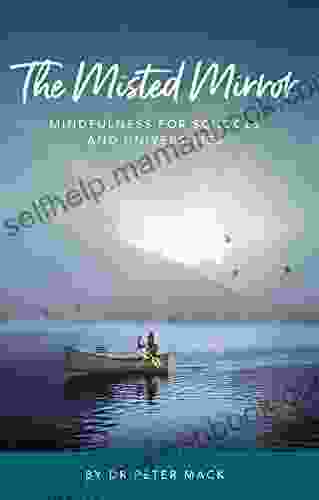
 Boris Pasternak
Boris PasternakThe Misted Mirror: Mindfulness for Schools and...
What is The Misted...

 Holden Bell
Holden BellEmbark on Thrilling Adventures in the Uncharted Depths of...
Unveiling the Enchanting...
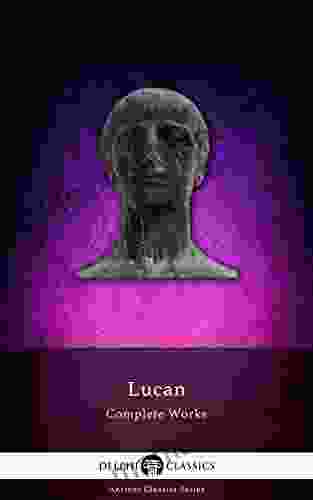
 Seth Hayes
Seth HayesDelphi Complete Works of Lucan: Illustrated Delphi...
This meticulously edited...

 Jackson Hayes
Jackson HayesThe Enigmatic Cat Burglar: Unraveling the Intriguing...
In the annals of crime, the name Bernie...
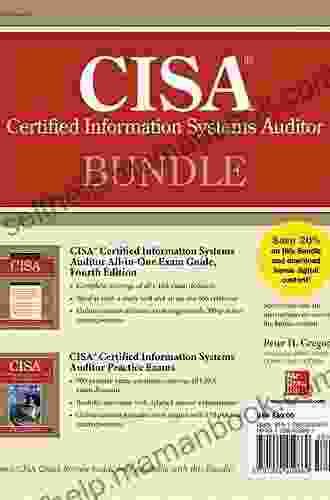
 Quentin Powell
Quentin PowellAligned With The Cisa Review Manual 2024 To Help You...
The CISA Review Manual 2024 is the most...

 Austin Ford
Austin FordUnlocking Revenue Potential: A Comprehensive Business...
In today's digital...
4.8 out of 5
| Language | : | English |
| File size | : | 827 KB |
| Text-to-Speech | : | Enabled |
| Screen Reader | : | Supported |
| Enhanced typesetting | : | Enabled |
| Word Wise | : | Enabled |
| Print length | : | 18 pages |
| Lending | : | Enabled |


